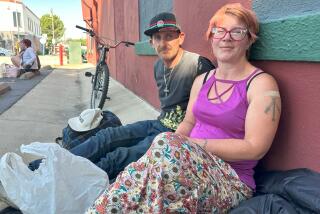A Country Doctor in the Big City : Santa Monica Resident Looks Back at Manhattan Practice
- Share via
Dr. Milton Slocum has mixed feelings about the state of medicine today.
On the one hand, he applauds the medical advances that have been made since he started his family practice in 1934. “Back then we really had only three drugs: Quinine, morphine and digitalis,” he recalled.
But Slocum doesn’t think too much of today’s doctors. “Medicine has progressed mechanically and chemically,” he said, “but it has regressed in many other ways.”
Slocum, who practiced medicine for 48 years and taught physical diagnosis at New York Medical College, is appalled by doctors who don’t take time to really listen to their patients; he is shocked by the fees physicians get today; he considers advertising by doctors “low and degrading.”
Slocum’s views may be old-fashioned, but he believes medicine should be practiced, well, more the way he practiced it.
Taking Coffee With His Patients
Until he retired in 1982 at the age of 77, Slocum was a doctor of the old school. He dropped in for coffee with his patients. He made daily house calls. He treated people who couldn’t afford treatment without bothering to send a bill.
He did, in short, everything a country doctor could be expected to do. But Slocum’s practice was in the heart of New York City. Slocum, who now lives in Santa Monica, tells the story of his smalltown practice in the big city in a new book, “Manhattan Country Doctor” (Charles Scribner’s Sons).
Hell’s Kitchen, the area of Manhattan in the west Forties and Fifties where Slocum practiced, was peopled during his time with a Runyonesque cast of characters, and Slocum treated them all. “I was a doctor and neither a judge nor dictator of morals,” Slocum wrote in his book.
Among his patients were girls in a brothel located directly upstairs from his office who came in for regular gonorrhea checks.
And there was the small-time racketeer and loan shark who so liked Slocom’s doctoring that he volunteered to provide him with a new--if not exactly legal--Cadillac. The man was later gunned down.
And there were policemen and drug dealers, fallen gentry and rising thugs--in short, there were among Slocum’s patients the full range of humanity.
Triumphs and Failures
Slocum’s book is a series of vignettes about the medical problems and lives of the people he treated. He writes about his triumphs, of course, but also about his failures. He even recounts how doubtful he was at first about the sulfa drugs that would revolutionize medicine. “It sounds too good to be true,” Slocum told a young doctor who asked him about sulfa drugs. “I’ve seen these miracle drugs come and go. I’m not too sure of any of them.”
The book’s case studies are far more, however, than fun reading. Through his examples Slocum sends a strong message about what he believes medicine should be and what it is not.
In a recent interview at his Santa Monica home, Slocum, a charming and wry grandfatherly sort, elaborated on the themes drawn in his book. “Every doctor should know that most of the complaints people have don’t require extensive medical care,” he said. “Most patients need someone willing to take the time to listen to what the patient is trying to say.”
Slocum cited the case of a woman who came to his office believing she had cancer. The woman was losing weight and in pain. But on talking to the woman, Slocum learned that, “The woman’s daughter wanted to marry outside her faith. Once she began talking about that, it became clear that this problem and not cancer was the source of her medical troubles.”
Slocum worries that most doctors today can’t or don’t take the time to really listen. “We’ve lost the intimate contact between patient and doctor that is essential to good medicine,” he said.
Of course, the kind of medicine Slocum believes in was not an easy kind of medicine to practice. His sense of mission demanded that he be available to all patients at all hours in all places.
Slocum writes of late-night house calls to roach-infested tenements, of sleepless nights devoted to his sick patients, and of interrupted plans. “My wife and I weren’t very popular dinner guests,” he said. “I had to get up and go so often in the middle of dinner.”
But Slocum loved his work, and his way was certainly made easier by his loving wife, Bell, and dedicated nurse, Peggy, both of whom Slocum writes about extensively in his book.
Perhaps the single-biggest reason Slocum liked his work was that he genuinely likes all kinds of people.
One day Slocum was summoned to attend a neighborhood woman whom he hadn’t seen in some time. When he got to her bedroom, he understood why she’d disappeared: The woman had gained so much weight she could no longer get out of bed. “She must have weighed 400 pounds or more,” Slocum writes. “More, surely, rather than less.”
The woman had summoned him because of a serious cough but Slocum insisted on talking with her about her weight. After a checkup, he discovered that the woman was suffering from serious heart problems, so he put her on a diet and prescribed heart medication.
“This was a determined woman,” Slocum writes. “She really ate only what I prescribed and took her medicine faithfully. In two weeks she was walking about the room.” After a year, the woman had lost nearly 100 pounds, and she was still dieting.”
But if Slocum the doctor was pleased with his patient’s progress, Slocum the student of human nature was unsatisfied. He wanted to know what had caused the woman to put on so much fat, but she was extremely reticent on the subject.
Dealing With a Jealous Husband
Finally, she satisfied his curiosity. “You asked me a long time ago why I let myself get so fat,” the woman finally said to Slocum. “I’ll tell you now . . . (my husband) is insanely jealous. He made my life miserable. I decided I’d stop his jealousy by getting so ugly no other man would look at me. That’s the story.”
Slocum believes that part of the reason he was an effective doctor is that he was very much a part of the community in which he practiced. “I had many families in which I was treating three generations,” Slocum said. “I knew the whole families. I knew where they lived, I knew what their lives were like. When we’d go through the neighborhood in a car, my wife would say ‘Now drive carefully. Some of those children playing in the street aren’t paid for yet.’ ”
But by 1968 when Slocum decided to give up his Hell’s Kitchen practice, the neighborhood was changing. “Urban renewal was beginning, and when they ripped out the buildings they ripped out friendships too,” Slocum said. “The old people from the neighborhood were scattered all over New York City living lonely lives.”
In the end, Slocum left too, moving with his wife to Santa Monica to be near their daughter and grandchildren. But things just weren’t the same.
“It wasn’t nearly as interesting as in New York. I was accustomed to living with my patients. I had delivered many of them and seen them grow up,” he said.
So when Slocum’s wife got cancer in 1982, he decided to give up his Santa Monica practice to care for her. After her death later that year, he elected not to resume doctoring and turned his attention instead to studying and writing.
More to Read
Sign up for Essential California
The most important California stories and recommendations in your inbox every morning.
You may occasionally receive promotional content from the Los Angeles Times.













